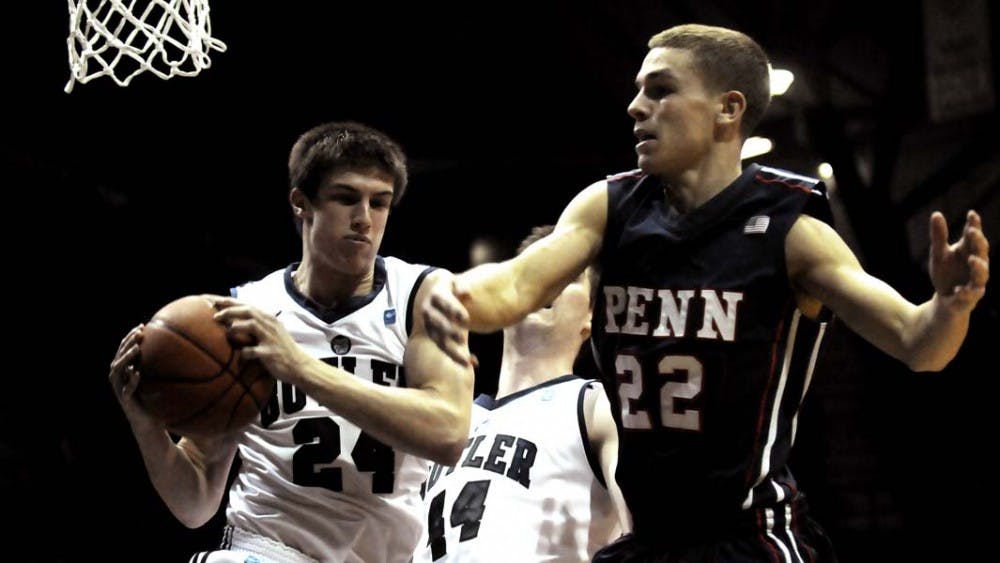
INDIANAPOLIS — Which unit of measurement is best in order to determine how much Penn missed Fran Dougherty, its leading scorer and rebounder, in Wednesday night’s 70-57 loss to Butler?
Is it 80 inches — his 6-foot-8 frame? His team-leading 15.7 points and 8.8 rebounds per game?
Or maybe it’s the 36-21 rebounding margin by which Butler beat Penn — and, more shockingly, the 13-3 difference on the offensive glass?
Yep, that’s the one.
Jerome Allen’s postgame message couldn’t have been more clear: Penn can’t keep allowing its opponents to dominate the boards so often, so easily, so early in the game.
And it’s not a matter of height — Butler’s tallest man on the floor, 6-foot-11 Andrew Smith, grabbed just five rebounds during a team-high 29 minutes on the floor. Kameron Wood, two inches shorter than Smith, led the Bulldogs with eight boards in 21 minutes; in 13 minutes for the Quakers, 6-foot-9 Cameron Gunter had one.
It’s instead a matter of will, of determination, of boxing out and doing whatever it takes to situate one’s self in an advantageous position to come away with the rebound.
Right now, especially without Dougherty, the Quakers don’t have that gut-check guy.
“Fran’s not a tall player in terms of our roster, I think he may be the third-tallest,” Allen pointed out — and he’s right. In addition to Gunter, 6-11 Darien Nelson-Henry is also longer. “Rebounding the basketball on the defensive end is a function of will. I think there are a number of players who have played this game I can document that it’s not always about size.”
In addition to Charles Barkley and Anthony Mason, a Hall of Famer and NBA All-Star of average-height (in pro standards), who made careers out of cleaning the glass, Allen also recalled Rob Belcore. Listed as a guard at 6-foot-6, Belcore led the Quakers in rebounding last season and sometimes even played the five.
Penn is so bad at securing rebounds this year that it’s past the point where it’s a contributing factor in its losses. It’s become the primary one, and in some cases perhaps even the sole detriment holding the team out of the victory column.
Take the first half Wednesday: The Quakers allowed Butler to come away with 11 offensive rebounds in the first half alone. Eleven. And they didn’t manage a single one themselves. The Bulldogs turned those second, and sometimes third, opportunities into 18 points. Penn didn’t have any second chances.
So what did the Quakers have to come away with after shooting 52.2 percent to Butler’s 41.2 rate in the first half? A six-point deficit at the break, and they’re lucky that’s all it was.
It’s been their biggest Achilles’ heel all year. On a typical night, Penn allows opponents to come away with 5.3 more offensive rebounds than it does. It’s why, despite a nearly identical field goal percentage between Penn (40.3 percent) and its foes (40.7), the Red and Blue still lose by an average of 5.9 points per contest — and that’s including their two wins.
Miles Cartwright recognizes it: “It’s obviously been a problem the whole year. I don’t think it’s a strategical effort, that’s all offensive rebounding is about. [It’s] just teams are obviously seeing that they can beat us on the boards, but we got to have more pride and battle more early.”
Simply acknowledging the problem isn’t enough, especially a dozen games into the season when you’ve lost 10 of your last 11 games.
Cartwright’s not the problem though — the 6-foot-3 point guard averages per game 3.1 rebounds, which is more than the 2.8 the 6-foot-8 Henry Brooks (who also starts!) brings in on a nightly basis.
Allen’s solution was straightforward, simple.
“It’s just being tough and wanting to be physical and wanting to have a sense of urgency about yourself that you just won’t surrender,” the coach said. “And that’s something that we don’t have yet.”
Maybe that’ll light a fire under his players. They badly need it.
MIKE WISNIEWSKI is a senior classical studies major from Philadelphia and sports editor of The Daily Pennsylvanian. He can be reached at dpsports@thedp.com.
SEE ALSO
Penn basketball bows to No. 17 Butler, 70-57
The Buzz | The Good, the Bad & the Ugly
The Buzz | Over/Under Butler Edition
The Daily Pennsylvanian is an independent, student-run newspaper. Please consider making a donation to support the coverage that shapes the University. Your generosity ensures a future of strong journalism at Penn.
DonatePlease note All comments are eligible for publication in The Daily Pennsylvanian.





